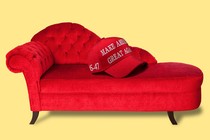From Aunt Uncle to Private First Class, Delta Company
3 min read
For Giovanni
The year my nephew becomes a man,
so do I, I guess.
He calls from boot camp after days of
hand-to-hand combat, voice husky. A few months
ago, at 17, playing Xbox, he could only imagine
what the inside of a gas chamber looked like.
I do not cry. It’s the testosterone: it
draws tears down to a reservoir
so deep in my body,
they turn to sheet ice.
Aunt Uncle has a beard now. Aunt
Uncle has a jaw that makes it harder to sleep. Aunt
Uncle still wears earrings and makeup. Aunt
Uncle no longer bleeds—does the nephew?
Each Sunday, I send him letters signed: Love, Aunt
and wonder who wrote them.
I wonder, too, about the boy
he put his hands on, which of them drew
blood first.
That day at the park, not so long ago, the ground
played to dust beneath our feet.
My nephew shot a look at me and said:
I didn’t know you were one of they-them.
But I’m not them, I tried to explain, I’m us.
His expression was tough to read–for the first time,
I can picture him in fatigues.
All through childhood, he looked
like that emoji, the one with glasses.
Strangers often mistook him for older than he was.
Once, when we were skating,
I watched him slice up
the ice so he could check on
a small child who had fallen.
Yesterday, a man
at a café told me I look like the frontman for U2.
Nowhere in my letters does it say that,
or how I am changing
the way leaves do, as if they must be on fire
before they fall. I drop
the envelopes in the mailbox, and they are weightless
as boyhood—the way I imagine it to be.
I write: Do not forget who you are.
Do not lose yourself.
It was me who gave him that name the day he was born:
Big Head. Years ago, in the darkness, I changed
his diaper and felt his legs reaching like a spider’s.
I couldn’t believe how excited a little kid could get
over strawberry yogurt, which tells you I knew nothing
about the joy collecting inside of him.
Now he does drills, and the parts that were once
boy harden like fruit skins in the sun. He packs a
rucksack, leaving most things behind. I want to shout
that we’re still with him:
Aunt, Uncle.
In my letters, I don’t—
I do not say I’m scared for what comes next.
Instead, I ask if
he’s been eating. I ask about the pancakes.
I ask about brotherhood.
When finally he gets to see his mother, he cries
like a man—like a man—
and then pulls up to a little window for fries and a McFlurry.
When I hear about all this, it will not be from him.
I never could
get him to read. Instead, we went ice
skating, he showed me his bikes, his tricks. We walked the boards.
And then, for his 18th birthday, to say goodbye,
I took him axe throwing,
watched him hit
the bullseye over and over,
the blade sinking deep into the splintered wood,
while I found it once or twice,
both of us still
just boys, deep down.



